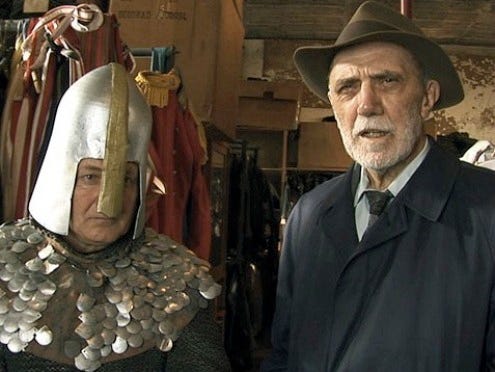Cinema Komunisto

For info and showtimes, click here.
A look at the film industry of Yugoslavia from the country's inception in 1945 to its demise in 1991, "Cinema Komunisto" is an oft-fascinating look at how movies can not only reflect a nation but actually shape its path.
Director Mila Turajlic was born in 1979, at the tail end of the reign of Yugoslavia's authoritarian leader, Josip Broz Tito. Her powerful documentary tells the story of her nation's birth and death and how the nationally controlled cinema was made to reflect and comment upon itself.
The film talks to dozens of critical players in the film industry, centered around the Avala Film studio built from scratch out of the young nation's rubble after World War II. Tito recognized the power of film, having learned at the knee of the Soviet Union's Joseph Stalin, and wanted to wield it as propaganda to unite and drive his people to rebuild.
Unfortunately, the newly designated movie technicians and producers knew little to nothing about filmmaking and had to bring in foreigners to teach them the basics. They made almost entirely war dramas glorifying the Yugoslav Partisans, which even those who made them acknowledge were "absolutely terrible."
According to Bata Zivojinovic, one of the country's greatest stars, "There are films where, start to finish, I'm just killing Germans."
The most compelling figure of this history is Leka Konstantinovic, who was Tito's personal projectionist from 1949 to the marshal's death in 1980. Following the meticulousness that often accompanies authoritarian regimes, Leka reveals that he carefully cataloged how many films he showed Tito: 8,801, or nearly 284 a year.
Tito had a genuine passion for movies, including Hollywood films, but he especially loved those produced in and about his own Yugoslavia. He was a dictator, but it's amazing how many of the old directors, set designers and actors interviewed in the documentary express their abiding affection for Tito.
"He lied to us a lot, but we all loved him," one succinctly puts it.
Things got interesting starting in 1962, when foreign movie stars and production companies were invited in to work in collaboration with the native companies. It was mostly a political ploy to divert much-needed foreign currency into the Yugoslav coffers, but the cultural boost clearly was significant, too.
"The Battle of Neretva" was nominated for an Academy Award for Best Foreign Language Film and featured international stars like Orson Welles, Yul Brynner, Franco Nero and Hardy Kruger.
Beyond their majestically beautiful landscapes, the Yugoslavs had one ace up their sleeve: a huge stash of tanks, planes and artillery — including lots of German ones — left over from the war.
The scenes at Avala Film today are sad and sobering, as the buildings stocked with thousands of costumes and props fall slowly into ruin.
"Cinema Komunisto" also follows the sudden demise of the national film industry in the civil wars of 1991-95, when Yugoslavia was torn apart into several nations in a horrendous fashion, including genocidal warfare. The one thing missing from the documentary is how a nation so long troubled by ethnic tensions could not reflect that in its cinema.
Still, this documentary takes us into a world few American audiences have seen and shows us the power that flickering images on a screen can have.
4 Yaps



